Cinnamon Tea and Beboparebop Rhubarb Pie
Tine and Rubob ventured far beyond their village today. Indeed, Tine proposed revising the header for her blog. "I think the description should say 'a blog partly set in Old Farmington Village,' because we took our walk in Millerton Village."
"And we should write to the London Review of Blogs to suggest that they say 'particularly picturesque,' " Tine added. Rubob had noted during the drive that the scenery was "a little of Vermont, a lot of Connecticut."
Tine and Rubob had taken the vehicle to Millerton for a spot of tea -- or taken the carriage, as Tine preferred, thinking of Julia Cowles (who wrote in the late 1700s about her rides out of Farmington Village). It was a good long drive, but there was much to talk about on the way, and as it happened they'd reached the teashop, next to the old railroad station, just as it was getting on teatime.

"We don't have a teashop in our own town," Tine said to Rubob. "It's nice to get out into the world at large."
"It helps us take a broader view," Rubob said. On the way to Millerton in the vehicle, Rubob had remarked on something he'd noticed in his portrait by the young artist (shown in an earlier entry in the blog today): "I had only one eye in it, Tine. I suppose that's appropriate, because I tend to focus on details and miss the broader view."
Rubob's head, cropped from his body, is shown below:
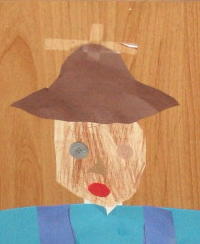
"I hadn't noticed that in the portrait, Rubob," Tine had said.
Rubob hadn't appeared to be offended by the portraitist's artistic license.
"I'm like the Joyce's Cyclops, Tine," Rubob had said.
"Who's that, Rubob?" Tine had asked.
"He's the one-eyed Irish patriot, who can't see past his purview, beyond his province, his prejudices, Tine. "
"That's a lot of p's," Tine had thought.
"He's xenophobic. Leopold Bloom is the foreigner, and as the traveler, the wanderer, he sees a great deal more," Rubob had continued.
Tine had said that Rubob was indeed broadening her view today.
"I'm your portal to the world at large, Tine," Rubob had said.
And seeing her scrawling something with a pencil on a scrap of paper, he asked, "What are you doing, Tine?"
"I'm your Boswell," Tine thought to herself, thinking of one of Rubob's favorite writers, who chronicled the life (and more particularly, the words) of one Samuel Johnson.
The two had arrived at Harney & Sons with Rubob engrossed in a discussion of Bloom's world view versus that of the patriot, and Tine absorbed in her scraps of paper.
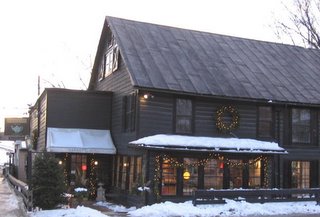
Rubob, who was running out of his favorite teas (and perhaps p's at this point, too), made a beeline for the counter where the teas are sold.

"I'll make a list, Tine: Earl Gray, Black Currant, Hot Cinnamon Spice, Vanilla ...."

"That's a long list," Tine said. She -- and a teapot, it seemed -- appeared eager to hasten to the tearoom and enjoy a nice cup of tea:
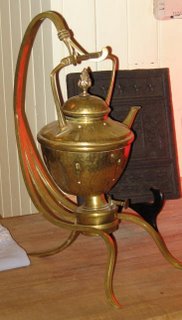
"I'll meet you in the cafe, Rubob. It's teatime, " Tine said.

It wasn't long before Rubob joined Tine at the small table she'd found in the tearoom.
After discussing the relative merits of what seemed to Tine to be Rubob's interminable list of teas, they settled on Hot Cinnamon Spice, which arrived in due course:

"Well!" Tine said, looking very content.
While Tine and Rubob enjoyed their tea, two red lanterns on the counter cast a warm glow over the room.
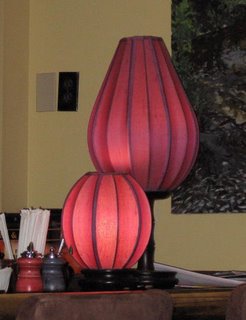
Before the pot was half empty, Tine had had more than a surfeit of tea (along with a dozen ginger cookies and jam).
"Tine's eyes are bigger than her stomach," Rubob remarked, not unkindly but with a chuckle.
After Rubob had finished the pot of Hot Cinnamon Tea, Rubob expressed an eagerness to return to the tea counter to sample a few more teas to purchase, including Russian Tea and Cranberry Autumn Tea.
Tine noticed a sign as she left the tearoom, and cautiously kept her head low, but it didn't apply to Tine's head, Rubob said, because Tine was very small:

Back in the tearoom, Rubob busied himself sampling two more cups of tea, the number permitted without charge, and with generous helpings from the sugarbowl. Rubob preferred a lump of sugar -- or two or three perhaps -- with his tea.

"Russian peasants always had a lump of sugar with their tea," he said.
"How do you know that, Rubob?" Tine asked.
"It's in Tolstoy and Dostoyevsky, Tine," Rubob said, helping himself to another lump -- "or at least in Tolstoy."
When Rubob paid for all his teas, there was a teapot shedding its light over the transaction:

"What was the building before Harney & Sons moved in?" Rubob asked the woman at the register.
"It was an ice house," she said, and Tine thought to herself, "Well, I'll be."
Infused with a sense of well-being, Tine headed for the door out of the teashop, but Rubob, feeling the effects of the tea, allowed that he needed to micturate, as he liked to say ("or more simply, he needs another 'p,' Tine thought.)
After the two left the teashop, Tine stopped to admire the train station, next to Harney & Sons.

Though the station had long been closed, Tine thought she could see a passenger waiting for his train at the far right end of the platform:

Tine then noticed a curious and charming fact about the town: All the Christmas trees, up and down the street, were decorated with red lights.
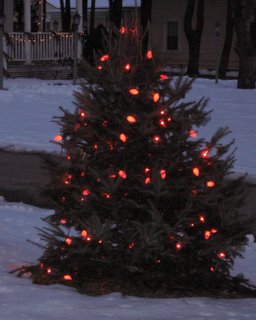
And the wreaths on the bridge by the teashop were sprouting red bulbs, too:
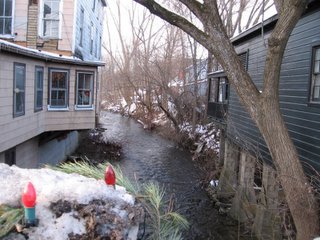
"It must be a red light district," Tine said to Rubob, and he chuckled.
The color of the tree lights was reflected by the sky, Rubob pointed out.

Tine then led Rubob into a store that sold books and music, and she was delighted to find the sheet music for "Beboparebob Rhubarb Pie," one of her favorite songs on "A Prairie Home Companion."
"One little thing can revive a guy
and that is homemade rhubarb pie.
Serve it up nice and hot.
Maye things aren't as bad as you thought.
Mama's little baby loves rhubarb, rhubarb,
bebop-a-rebop, rhubarb pie.
Mama's little baby loves rhubarb, rhubarb,
bebop-a-rebop, rhubarb pie."
Back outside, Tine ambled down the sidewalk humming the tune to herself.
Rubob, seeing "Millerton" on many of the storefronts, said, "'The Miller's Tale' is one of the best in 'Canterbury Tales,' Tine."
"What's it about, Rubob?" Tine asked.
"I can't recall everything, but it's one of Chaucer's baudiest tales, and involves the usual theme of the husband getting cuckolded -- in this case Old John, the Carpenter, by a rogue named Nicholas."
"Maybe that's why Millerton is a red light district," Tine said, stopping to admire more Christmas trees:

"Very picturesque -- and very picaresque," Tine said, to no one in particular, thinking of Rubob's roving rogues.
"I think we should be getting back to the vehicle, Rubob. It's getting dark. We won't have much of a walk today, will we? It was mostly driving."
On their way back to the carriage, as Tine liked to think of it, she thought to herself: "I'll write to the London Review of Blogs: "Picaresque and picturesque, but sometimes not particularly peripatetic."
But, she thought: "All in all, it was a particularly pleasant walk. "
"And we should write to the London Review of Blogs to suggest that they say 'particularly picturesque,' " Tine added. Rubob had noted during the drive that the scenery was "a little of Vermont, a lot of Connecticut."
Tine and Rubob had taken the vehicle to Millerton for a spot of tea -- or taken the carriage, as Tine preferred, thinking of Julia Cowles (who wrote in the late 1700s about her rides out of Farmington Village). It was a good long drive, but there was much to talk about on the way, and as it happened they'd reached the teashop, next to the old railroad station, just as it was getting on teatime.

"We don't have a teashop in our own town," Tine said to Rubob. "It's nice to get out into the world at large."
"It helps us take a broader view," Rubob said. On the way to Millerton in the vehicle, Rubob had remarked on something he'd noticed in his portrait by the young artist (shown in an earlier entry in the blog today): "I had only one eye in it, Tine. I suppose that's appropriate, because I tend to focus on details and miss the broader view."
Rubob's head, cropped from his body, is shown below:

"I hadn't noticed that in the portrait, Rubob," Tine had said.
Rubob hadn't appeared to be offended by the portraitist's artistic license.
"I'm like the Joyce's Cyclops, Tine," Rubob had said.
"Who's that, Rubob?" Tine had asked.
"He's the one-eyed Irish patriot, who can't see past his purview, beyond his province, his prejudices, Tine. "
"That's a lot of p's," Tine had thought.
"He's xenophobic. Leopold Bloom is the foreigner, and as the traveler, the wanderer, he sees a great deal more," Rubob had continued.
Tine had said that Rubob was indeed broadening her view today.
"I'm your portal to the world at large, Tine," Rubob had said.
And seeing her scrawling something with a pencil on a scrap of paper, he asked, "What are you doing, Tine?"
"I'm your Boswell," Tine thought to herself, thinking of one of Rubob's favorite writers, who chronicled the life (and more particularly, the words) of one Samuel Johnson.
The two had arrived at Harney & Sons with Rubob engrossed in a discussion of Bloom's world view versus that of the patriot, and Tine absorbed in her scraps of paper.

Rubob, who was running out of his favorite teas (and perhaps p's at this point, too), made a beeline for the counter where the teas are sold.

"I'll make a list, Tine: Earl Gray, Black Currant, Hot Cinnamon Spice, Vanilla ...."

"That's a long list," Tine said. She -- and a teapot, it seemed -- appeared eager to hasten to the tearoom and enjoy a nice cup of tea:

"I'll meet you in the cafe, Rubob. It's teatime, " Tine said.

It wasn't long before Rubob joined Tine at the small table she'd found in the tearoom.
After discussing the relative merits of what seemed to Tine to be Rubob's interminable list of teas, they settled on Hot Cinnamon Spice, which arrived in due course:

"Well!" Tine said, looking very content.
While Tine and Rubob enjoyed their tea, two red lanterns on the counter cast a warm glow over the room.

Before the pot was half empty, Tine had had more than a surfeit of tea (along with a dozen ginger cookies and jam).
"Tine's eyes are bigger than her stomach," Rubob remarked, not unkindly but with a chuckle.
After Rubob had finished the pot of Hot Cinnamon Tea, Rubob expressed an eagerness to return to the tea counter to sample a few more teas to purchase, including Russian Tea and Cranberry Autumn Tea.
Tine noticed a sign as she left the tearoom, and cautiously kept her head low, but it didn't apply to Tine's head, Rubob said, because Tine was very small:

Back in the tearoom, Rubob busied himself sampling two more cups of tea, the number permitted without charge, and with generous helpings from the sugarbowl. Rubob preferred a lump of sugar -- or two or three perhaps -- with his tea.

"Russian peasants always had a lump of sugar with their tea," he said.
"How do you know that, Rubob?" Tine asked.
"It's in Tolstoy and Dostoyevsky, Tine," Rubob said, helping himself to another lump -- "or at least in Tolstoy."
When Rubob paid for all his teas, there was a teapot shedding its light over the transaction:

"What was the building before Harney & Sons moved in?" Rubob asked the woman at the register.
"It was an ice house," she said, and Tine thought to herself, "Well, I'll be."
Infused with a sense of well-being, Tine headed for the door out of the teashop, but Rubob, feeling the effects of the tea, allowed that he needed to micturate, as he liked to say ("or more simply, he needs another 'p,' Tine thought.)
After the two left the teashop, Tine stopped to admire the train station, next to Harney & Sons.

Though the station had long been closed, Tine thought she could see a passenger waiting for his train at the far right end of the platform:

Tine then noticed a curious and charming fact about the town: All the Christmas trees, up and down the street, were decorated with red lights.

And the wreaths on the bridge by the teashop were sprouting red bulbs, too:

"It must be a red light district," Tine said to Rubob, and he chuckled.
The color of the tree lights was reflected by the sky, Rubob pointed out.

Tine then led Rubob into a store that sold books and music, and she was delighted to find the sheet music for "Beboparebob Rhubarb Pie," one of her favorite songs on "A Prairie Home Companion."
"One little thing can revive a guy
and that is homemade rhubarb pie.
Serve it up nice and hot.
Maye things aren't as bad as you thought.
Mama's little baby loves rhubarb, rhubarb,
bebop-a-rebop, rhubarb pie.
Mama's little baby loves rhubarb, rhubarb,
bebop-a-rebop, rhubarb pie."
Back outside, Tine ambled down the sidewalk humming the tune to herself.
Rubob, seeing "Millerton" on many of the storefronts, said, "'The Miller's Tale' is one of the best in 'Canterbury Tales,' Tine."
"What's it about, Rubob?" Tine asked.
"I can't recall everything, but it's one of Chaucer's baudiest tales, and involves the usual theme of the husband getting cuckolded -- in this case Old John, the Carpenter, by a rogue named Nicholas."
"Maybe that's why Millerton is a red light district," Tine said, stopping to admire more Christmas trees:

"Very picturesque -- and very picaresque," Tine said, to no one in particular, thinking of Rubob's roving rogues.
"I think we should be getting back to the vehicle, Rubob. It's getting dark. We won't have much of a walk today, will we? It was mostly driving."
On their way back to the carriage, as Tine liked to think of it, she thought to herself: "I'll write to the London Review of Blogs: "Picaresque and picturesque, but sometimes not particularly peripatetic."
But, she thought: "All in all, it was a particularly pleasant walk. "







